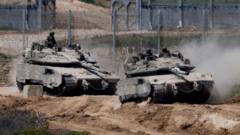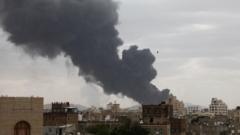The latest military strategy involves a significant expansion of operations against Hamas, with plans for territorial occupation and displacement of Gaza's population despite growing international concern over humanitarian impacts.
**Israel Reinforces Offensive Strategy in Gaza, Aims for Territory Control**

**Israel Reinforces Offensive Strategy in Gaza, Aims for Territory Control**
Israel's security cabinet greenlights a plan for intensified military action aimed at controlling Gaza amidst humanitarian warnings.
In a decisive move, Israel's security cabinet has approved a comprehensive plan to escalate its military offensive against Hamas, which reportedly includes measures for the "capture" and long-term control of Gaza. Prime Minister Benjamin Netanyahu announced that the initiative aims to dismantle Hamas's operational capabilities while also ensuring the safety of hostages still held by the group.
The new strategy comes as the Israeli military calls up tens of thousands of reservists, preparing for increased pressure on Hamas. Netanyahu emphasized that the military operation would not involve any temporary incursions, stating, “They will not enter and come out.”
In addition to military actions, the cabinet also endorsed a controversial plan allowing private companies to deliver humanitarian aid, a move criticized by the UN and various humanitarian organizations for potentially undermining fundamental humanitarian principles. The UN has warned that such actions could exacerbate the dire humanitarian crisis in Gaza, where a blockade has already led to acute food shortages and a near collapse of essential services.
Reactions to the Israeli government's approach have been mixed internationally. Former President Donald Trump expressed support for food aid to Palestinian civilians, while the UK and EU voiced concerns over the potential for increased civilian casualties. According to an Israeli official, the cabinet unanimously supported a plan that includes significant military operations aimed at overpowering Hamas, denying the group facilities to distribute humanitarian aid, and relocating Gazan residents for their own safety.
The Israel Defense Forces (IDF) have indicated that the military campaign will likely lead to widespread displacement of the Gazan population as operations escalate. Critics of the government’s approach argue that military actions have not effectively secured the return of hostages and emphasize that public sentiment leans towards prioritizing their release over territorial gains.
Representatives from Hamas assert that their demands include an overall ceasefire, full withdrawal from Gaza, and a comprehensive agreement that addresses prisoner exchanges. Meanwhile, residents of northern Gaza have expressed defiance at the prospect of forced relocations, with many determined to remain amidst the ongoing conflict.
As the humanitarian situation worsens, community kitchens in Gaza are reportedly on the verge of depleting their supplies, and health officials have raised alarms about a surge in hunger and malnutrition due to interrupted aid deliveries.
Israel's military offensive commenced as a reaction to a deadly attack on October 7, which resulted in substantial casualties and sparked a wave of retaliatory aggression. The ongoing strife has inflicted heavy tolls on both sides, with the conflict intensifying further as humanitarian prospects worsen.
The new strategy comes as the Israeli military calls up tens of thousands of reservists, preparing for increased pressure on Hamas. Netanyahu emphasized that the military operation would not involve any temporary incursions, stating, “They will not enter and come out.”
In addition to military actions, the cabinet also endorsed a controversial plan allowing private companies to deliver humanitarian aid, a move criticized by the UN and various humanitarian organizations for potentially undermining fundamental humanitarian principles. The UN has warned that such actions could exacerbate the dire humanitarian crisis in Gaza, where a blockade has already led to acute food shortages and a near collapse of essential services.
Reactions to the Israeli government's approach have been mixed internationally. Former President Donald Trump expressed support for food aid to Palestinian civilians, while the UK and EU voiced concerns over the potential for increased civilian casualties. According to an Israeli official, the cabinet unanimously supported a plan that includes significant military operations aimed at overpowering Hamas, denying the group facilities to distribute humanitarian aid, and relocating Gazan residents for their own safety.
The Israel Defense Forces (IDF) have indicated that the military campaign will likely lead to widespread displacement of the Gazan population as operations escalate. Critics of the government’s approach argue that military actions have not effectively secured the return of hostages and emphasize that public sentiment leans towards prioritizing their release over territorial gains.
Representatives from Hamas assert that their demands include an overall ceasefire, full withdrawal from Gaza, and a comprehensive agreement that addresses prisoner exchanges. Meanwhile, residents of northern Gaza have expressed defiance at the prospect of forced relocations, with many determined to remain amidst the ongoing conflict.
As the humanitarian situation worsens, community kitchens in Gaza are reportedly on the verge of depleting their supplies, and health officials have raised alarms about a surge in hunger and malnutrition due to interrupted aid deliveries.
Israel's military offensive commenced as a reaction to a deadly attack on October 7, which resulted in substantial casualties and sparked a wave of retaliatory aggression. The ongoing strife has inflicted heavy tolls on both sides, with the conflict intensifying further as humanitarian prospects worsen.




















